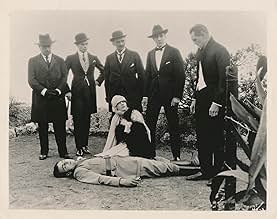Ajouter une intrigue dans votre langueA Russian prince has to flee his country after fighting a duel. He falls in love with a duchess, but becomes jealous when he finds out she has a lover.A Russian prince has to flee his country after fighting a duel. He falls in love with a duchess, but becomes jealous when he finds out she has a lover.A Russian prince has to flee his country after fighting a duel. He falls in love with a duchess, but becomes jealous when he finds out she has a lover.
- Récompenses
- 3 victoires au total
Jeanne Brindeau
- Madame Spadoni
- (as Madame Jean Brindeau)
Louis Wolheim
- Undetermined Secondary Role
- (scènes coupées)
Evelyn Arnold
- Dancer
- (non crédité)
Maxina Arnold
- Dancer
- (non crédité)
Constance Berry
- Polish Beauty
- (non crédité)
Arline Booth
- Swedish Beauty
- (non crédité)
Clara Bow
- Girl Dancing on Table
- (non crédité)
Histoire
Le saviez-vous
- AnecdotesAn incomplete 35mm print of this film exists at The Library of Congress.
- ConnexionsReferenced in Clara Bow: Discovering the It Girl (1999)
Commentaire à la une
Lionel Barrymore is a rich, degenerate Russian nobleman with gaggles of beautiful women hanging around his palace, dancing and playing harps and doing everything else for his pleasure. He thinks of nothing else. The only woman he likes is Alma Rubens, who also enjoys her pleasures. They have never gotten together because, as he puts it, they each want to dominate in their short relations, and that wouldn't work. After he kills her brother, he leaves Russia, first for Paris, then when the Great War breaks out, Monte Carlo. There he surrounds himself with like-minded male pleasure seekers; they call themselves 'the enemies of women.'
Monte itself has turned into a maelstrom of self-indulgence, fueled by the profits of war. Barrymore is amused that Miss Rubens has taken a young lover to herself. She doesn't know that the youth she lavishes her affection and the shrinking remnants of her fortune on is actually her son.
This movie is based on an Ibáñez novel. It is in poor shape. Twenty minutes of its length are missing, and large sections of the rest are in poor condition. Director Alan Crosland clearly has a big budget, and many beautiful women, including an early role for Clara Bow, and one for Margaret Dumont as one of a number of 'French beauties'. He lacks the flair for scenes of degeneracy that Demille had, and that Rex Ingram showed in THE FOUR HORSEMEN OF THE APOCALYPSE. Barrymore himself is pretty good, but it's odd to see him so physically active, stripping for a duel or wrestling with Ivan Linow... I've seen him in too many talkies, confined to a wheelchair, grumbling his lines.
Despite that, this movie remains watchable through its remaining length, if a bit simplistic and Bible-quoting. The print I saw, derived from one held by the Library of Congress, is probably the best available. It may be that the missing scenes would raise it to a major work of cinema, but, alas, we are confined to what we can actually see.
Monte itself has turned into a maelstrom of self-indulgence, fueled by the profits of war. Barrymore is amused that Miss Rubens has taken a young lover to herself. She doesn't know that the youth she lavishes her affection and the shrinking remnants of her fortune on is actually her son.
This movie is based on an Ibáñez novel. It is in poor shape. Twenty minutes of its length are missing, and large sections of the rest are in poor condition. Director Alan Crosland clearly has a big budget, and many beautiful women, including an early role for Clara Bow, and one for Margaret Dumont as one of a number of 'French beauties'. He lacks the flair for scenes of degeneracy that Demille had, and that Rex Ingram showed in THE FOUR HORSEMEN OF THE APOCALYPSE. Barrymore himself is pretty good, but it's odd to see him so physically active, stripping for a duel or wrestling with Ivan Linow... I've seen him in too many talkies, confined to a wheelchair, grumbling his lines.
Despite that, this movie remains watchable through its remaining length, if a bit simplistic and Bible-quoting. The print I saw, derived from one held by the Library of Congress, is probably the best available. It may be that the missing scenes would raise it to a major work of cinema, but, alas, we are confined to what we can actually see.
Meilleurs choix
Connectez-vous pour évaluer et suivre la liste de favoris afin de recevoir des recommandations personnalisées
Détails
Box-office
- Montant brut aux États-Unis et au Canada
- 476 080 $US
- Durée1 heure 45 minutes
- Couleur
- Mixage
- Rapport de forme
- 1.33 : 1
Contribuer à cette page
Suggérer une modification ou ajouter du contenu manquant

Lacune principale
By what name was Les ennemis de la femme (1923) officially released in Canada in English?
Répondre

















